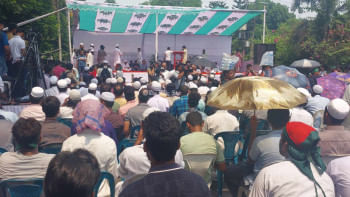Anxiety, uncertainty in Khasi villages
Nearly 1,400 Khasi people in Moulvibazar's Kulaura upazila have been left stranded in their villages for the last one week, as the authorities of Jhimai tea estate are not allowing them to use the government road through the tea garden.
The five affected villages are Puran choilta, Balaima, Amuli, Kalapahar (Notunchilta) and Jhimai Punjee. The villagers use the road that passes through the tea garden to go to markets or bring goods to the villages.
The restriction is the result of a disagreement between the Khasi people and the tea garden authorities over the ownership of 300 acres of land in the tea garden, locals said. The tea estate was given 672 acres of land in 1937 by the then government but they planted only on some 300 acres.
The Khasi people claimed the ownership of the land as they have been living on the land for years. They use the land for betel leaf cultivation, which is the main source of their income.
The tea garden authorities, on the other hand, claimed that the Khasi people grabbed the 300 acres of land which they took as lease from the government years ago for tea plantation.
Dorina Dhar, a resident of Jhimai Punjee, said, “We feel insecure. They may evict us at any moment. Every day we pass in a state of panic.”
Rana Surong, headman of the Jhimai Punjee, said the indigenous people are scared to go out of the punjee after the tea garden management ordered the Khasi people not to use the road.
Yesterday, the Khasi people sent a letter to the upazila nirbahi officer (UNO) of Kulaura, requesting him to solve the problem and open the road.
Putting an iron bar on a government road and creating obstacle to movement of people was a violation of human rights, reads the letter. The Daily Star has obtained a copy of the letter.
Father Joseph Gomes, a Moulvibazar-based central committee member of Bangladesh Paribesh Andolon (Bapa), said the tea garden authorities had put an iron bar across the road and restricted all sorts of movement.
He went to visit the indigenous people of those villages on last Sunday, but the tea garden authorities did not allow his car to ply that road.
The authorities, however, started allowing only pedestrians to use the road from yesterday, he added.
Contacted, Motiar Rahman, officer-in-charge of Kulaura Police Station, confirmed the matter to The Daily Star. He said the Khasi people didn't file any complaint against the tea garden authorities.
Meanwhile, Bangladesh Paribesh Andolon yesterday at a press conference at Dhaka Reporters' Unity auditorium in the city protested the tea garden authorities' move to evict Khasi people from the land they have been living on for generations.
Noted columnist Syed Abul Maksud, vice-president of Bapa, said incidents of land grabbing of the indigenous people and evicting them from their ancestral land have increased in recent times.
Sanjeeb Drong, general secretary of Bangladesh Adivasi Forum and Sharif Jamil, joint secretary of Bapa, among others, were present at the press conference.

 For all latest news, follow The Daily Star's Google News channel.
For all latest news, follow The Daily Star's Google News channel. 



Comments